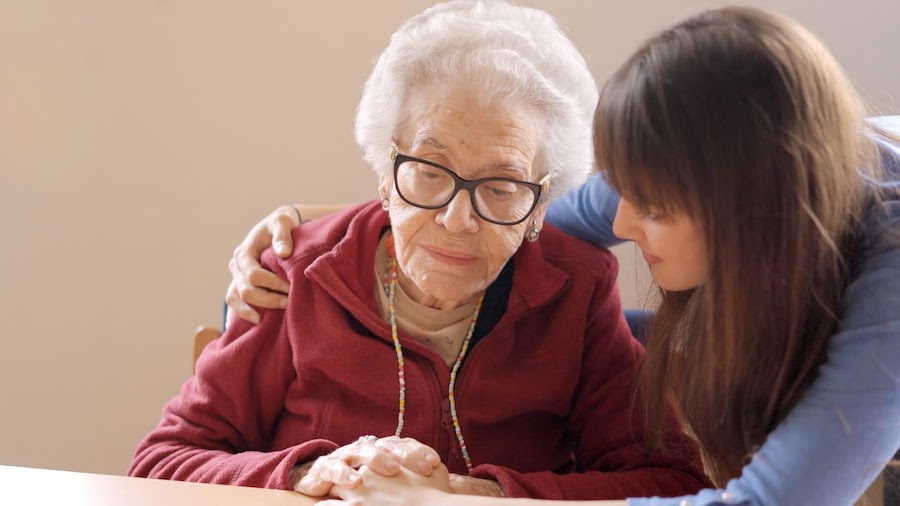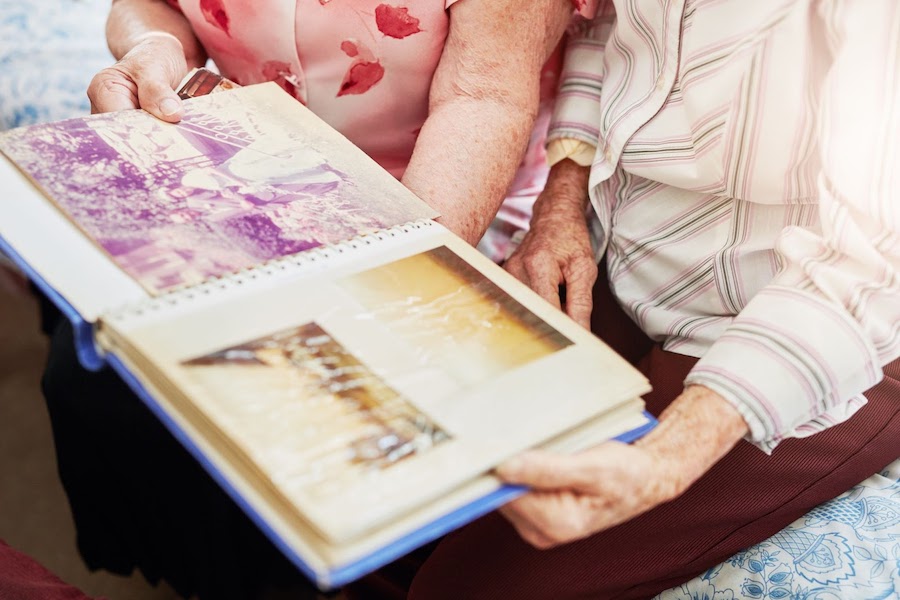When a loved one is diagnosed with dementia, it can feel like you’re starting on a journey filled with unknowns. But understanding the stages of dementia can help families set realistic expectations, prepare for changing needs, and recognize when family caregivers need more support. Dementia is a life-limiting illness that is progressive in nature. As dementia progresses, a patient’s abilities and needs will change.
Knowing what to anticipate at each of the 7 stages of dementia before death can help families make adjustments to their loved one’s living environment, daily routines, and care strategies.
This information goes a long way towards ensuring the patient’s safety, comfort, and a quality of life that honors their dignity and needs.
In a journey with lots of unknowns, accurate information can be like a compass in (what feels like) uncharted territory. Throughout the journey, a caring hospice provider can bring compassionate, holistic care that addresses the needs of a patient — AND the needs of their families. In this blog, we want to walk you through each of the 7 stages of dementia to help you know how to best support your loved one.
What Are the 7 Stages of Dementia Before Death?
In identifying dementia, healthcare providers use an assessment called the Global Deterioration Scale (GDS), or Reisberg Scale. This scale helps gauge the progression of dementia over time and establishes a baseline for a patient’s cognitive function. While the GDS isn’t a diagnostic tool, it helps create a clearer picture of where an individual falls on the dementia spectrum.
The GDS categorizes cognitive decline into 7 stages. These stages range from “no cognitive decline” to “very severe cognitive decline.” When a patient shows signs of memory loss or cognitive impairment, the GDS can help professionals determine how advanced the symptoms are. It can also help medical providers and families make decisions about the level of care needed, appropriate therapies, and adjustments in living arrangements.
Let’s look at an overview of the GDS and then dive a little deeper into each of the stages.

| 7 Stages of Dementia Before Death | Symptoms |
|---|---|
| 1: No cognitive decline | The individual doesn’t show signs of memory loss. |
| 2: Very mild cognitive decline (age-associated memory impairment) | The person notices they’re having trouble remembering things (like where they’ve placed regularly-used items or the names of people they used to know well). |
| 3: Mild cognitive decline (mild cognitive impairment) | More noticeable signs of memory and concentration issues Getting lost in new places Not performing as well at work Struggling to remember names or forgetting what they’ve just read Losing valuable items Trouble focusing |
| 4: Moderate cognitive decline (mild dementia) | Clear signs of memory loss in a detailed medical assessment Knowing less about recent events or their own past Struggling with tasks that require focus (like counting backwards) Difficulty managing daily activities like traveling or handling money Difficulty with complex tasks Less emotionally responsive Patients usually still know who they are and recognize familiar people |
| 5: Moderately severe cognitive decline (moderate dementia) | Needs help with daily life because they can’t remember important personal information, like their address, phone number, or family members’ names Confusion about the date or where they are Struggles with simple math, like counting backwards by fours or twos May need help choosing what to wear |
| 6: Severe cognitive decline (moderately severe dementia) | In stage 6 of the 7 stages of dementia before death, the person: Becomes very dependent on others for basic needs Doesn’t remember recent events, with only a vague memory of their past Confusion about their location, what year it is, or the current season Has trouble counting to 10 Requires help with day-to-day tasks (like using the bathroom) Has trouble traveling (but may remember familiar routes) Has irregular sleep patterns Experiences changes in personality and emotions (like inaccurate beliefs, anxiety, or aggression) Has difficulty making decisions or planning Has difficulty focusing on thoughts (though they may remember their name and recognize familiar faces) |
| 7: Very severe cognitive decline (severe dementia) | In this stage of the 7 stages of dementia before death, the patient: Loses the ability to speak Needs help with personal care (eating, using the bathroom) Difficulty walking or controlling movements Stiffness and poor reflexes |
Stage 1: No Cognitive Decline
At this initial stage, there’s no evidence of dementia. The patient isn’t showing symptoms and can go about their daily life as normal. While no action is required at this stage, it’s a good time to focus on healthy lifestyle choices such as a balanced diet, regular exercise, and cognitive stimulation to maintain brain health.

Stage 2: Very Mild Cognitive Decline
In this stage, individuals may notice slight changes in memory or cognition. These changes are usually attributed to normal aging. A person might forget familiar words or where they’ve placed everyday objects. However, it’s often not obvious to those around them, and the changes don’t usually interfere with their daily activities.
Tip for Families:
Caregivers can support their loved ones by establishing a routine for taking medications and attending regular medical check-ups to monitor their overall health.
Stage 3: Mild Cognitive Decline
Friends and family may start to notice more significant lapses in memory and cognitive function. Your loved one might have trouble finding the right words, particularly when they’re naming objects. They may struggle with planning, organizing, or focusing, causing issues at work or in social situations. In this stage, a person might start to deny these issues are happening and feel mild to moderate anxiety about their symptoms. A medical provider can confirm dementia with a detailed, clinical interview.
Tip for Families:
Encourage your loved one to participate in light social activities and hobbies they enjoy. This can help to maintain their cognitive function and emotional health. It also might be time to discuss future care preferences, start learning about hospice providers, and consider any legal and financial planning.
Stage 4: Moderate Cognitive Decline
When a person reaches this time in the 7 stages of dementia before death, their challenges become more apparent. Patients may forget recent events or personal details and have difficulty managing finances or traveling alone. Complex tasks become difficult, and the person might start to deny these issues, seem less emotionally responsive, or avoid difficult situations. However, individuals at this stage usually still know where they are, recognize familiar people, and can get to places they know well.
Tip for Families:
At this stage, maintaining a structured routine can give your loved one a sense of security and can also help manage changes in behavior and mood. Caregivers can help a patient by breaking down tasks into more manageable steps and use memory aids like lists and calendars.
Stage 5: Moderately Severe Cognitive Decline
In stage 5, memory gaps continue to widen. An individual may need help with basic daily activities such as dressing, bathing, and preparing meals. They may also become disoriented about time or place. During this stage, it’s important to maintain a safe and familiar environment. Generally, patients still remember their own names and major details about their life and can do basic tasks like using the bathroom and eating without help. But at this point in the 7 stages of dementia before death, they might need assistance with tasks like choosing what to wear.
Tip for Families:
Use labels and signs around the house and consider adaptive clothing to make dressing easier. It’s equally important to show empathy and patience, as your loved one may start to feel frustrated with their increasing dependencies.

Stage 6: Severe Cognitive Decline
In stage 6, communication becomes more challenging for a patient. They might also experience significant personality changes and more pronounced memory loss. Individuals may be unable to recognize even close relatives. At this point, consistent and supportive care is crucial.
Tip for Families:
Simplify communication by using clear, short sentences and visual cues. It’s also important to monitor for any signs of pain or discomfort, as your loved one may have difficulty expressing their needs.
Stage 7: Very Severe Cognitive Decline
This is the final stage in the 7 stages of dementia before death. At this point in the disease’s progression, individuals lose the ability to engage with their environment, communicate, or control movement. They may spend most of their time in bed and require full-time care.
Tip for Families:
It’s important to focus on comfort care. Your hospice team can develop a personalized care plan to manage pain, discomfort, and any emotional distress. When families need caregiving help, hospice care can provide the necessary support — not just for physical care, but also emotional and spiritual resources for the individual and the family.
Hospice Support During the 7 Stages of Dementia Before Death
It can be challenging to determine the right time for hospice care, but it’s generally when the focus shifts from curative treatments to comfort and quality of life. If your loved one is experiencing frequent medical complications and a noticeable decline in cognitive and physical abilities, it may be time to consider hospice care. If you have questions about preparing your home (and heart) for hospice care, check out this blog post.
When a loved one receives a dementia diagnosis, here are some things you can do:
- Educate yourself about dementia to understand what your loved one is going through.
- Build a support network, seek resources, and don’t hesitate to join support groups for caregivers.
- Create meaningful experiences with your loved one, like listening to their favorite music or looking through old photo albums.
- This is a big one: Look after your own well-being. Caregiving can feel overwhelming, and it’s important to stay mentally and emotionally healthy while you’re caring for your loved one.

When You Have Questions, We’re Here for You
Dementia is a complex condition, and it’s common for patients and families to feel overwhelmed while navigating the 7 stages of dementia before death. But knowledge is empowering, and it can help you prepare and support your loved one. During the later stages of dementia, a quality hospice team can make all the difference. We can provide a patient with comprehensive care that meets their individual needs AND support families experiencing loss.
At Envision Hospice, we’re dedicated to walking alongside families throughout this journey. We’re here to support you with information, personalized care, compassion, and professionalism. By providing information and support, we can help you prepare, process, and ensure your loved one receives the right level of care. Dementia is a complex condition, but we’re here to walk with you every step of the way.

